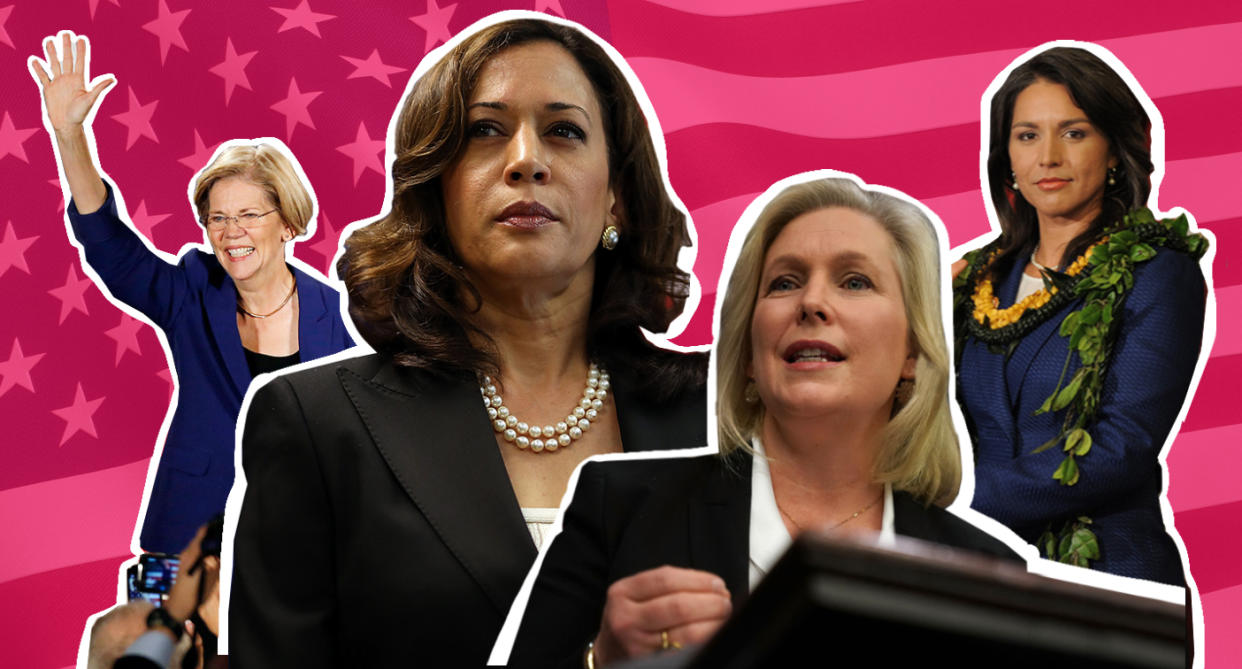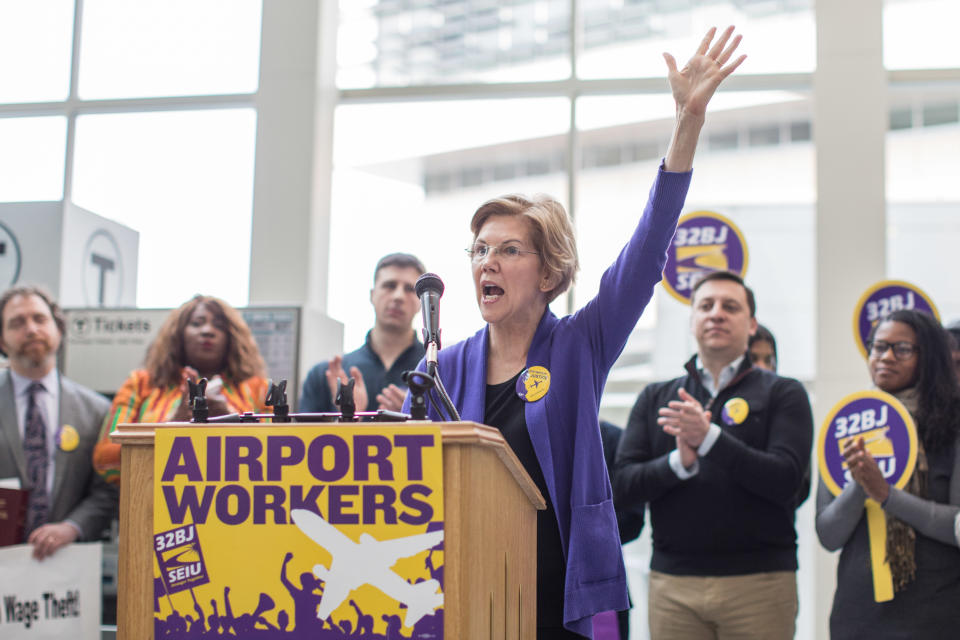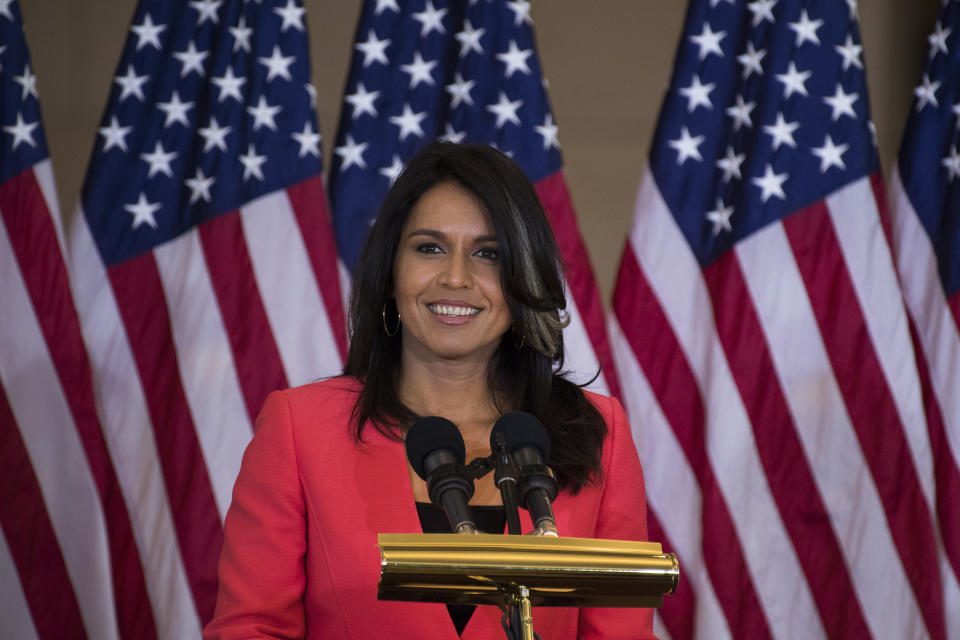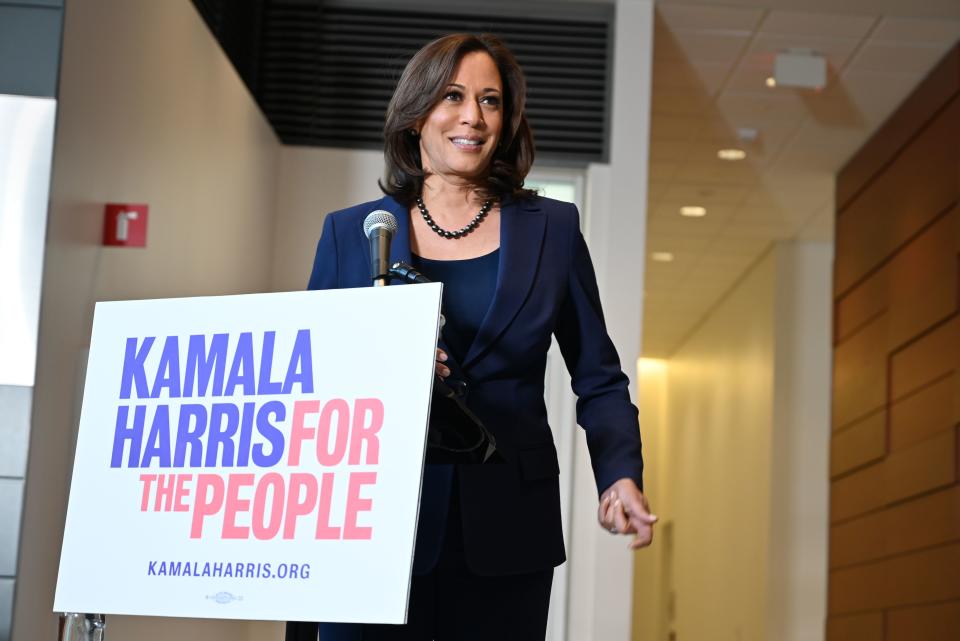Everything you need to know about the women running for president in 2020

Guess what, America: The odds that the next leader of the free world could be a woman have gone up — and we are here for it.
Following the historic Women’s Wave that swept the 2018 midterm elections, four female Democratic members of Congress have already announced their intention to run for president in 2020, including Sen. Elizabeth Warren of Massachusetts, Sen. Kirsten Gillibrand of New York, Rep. Tulsi Gabbard of Hawaii and Sen. Kamala Harris of California. These lawmakers have already made history with their bids, marking the first time that more than one woman will compete for the Democratic Party’s nomination.
But for each woman who has declared an intention to run, there have been accolades as well as criticism. Here’s a breakdown of the female presidential hopefuls so far and what’s being said about them.
Sen. Elizabeth Warren, D-Mass.

Her platform: Massachusetts Sen. Elizabeth Warren ended the Year of the Woman with an epic announcement: She would be launching an exploratory committee to run for president, becoming the first Democrat to step up for 2020. In a video released on New Year’s Eve, the Massachusetts politician said she wants to fight the “echo chamber of fear and hate designed to distract and divide us.” If elected president, the first female senator representing Massachusetts promises to “rebuild America’s middle class” after spending her career tackling economic inequality in the country.
The criticism: Warren’s announcement was quickly followed by an onslaught of sexist comments from political pundits evaluating her “likability” and “electability,” a characteristic rarely applied to male candidates and one that shouldn’t be used to judge efficacy as president. While Warren took the high road, even joking on a train ride to New York City that “female candidates are most likable in the quiet car,” men and women online called out media outlets on their biased speculations.
I hear women candidates are most likable in the quiet car! I’ll be talking again on @maddow @ 9pm ET. pic.twitter.com/DnVIw2RSgG
— Elizabeth Warren (@ewarren) January 2, 2019
Tulsi Gabbard, D-Hawaii

Her platform: Rep. Tulsi Gabbard, who represents Hawaii’s Second Congressional District, has been on the front lines for the United States as a soldier in Iraq. Now she plans to continue the fight on home turf. While promising to tackle issues including health care, climate change, and criminal justice reform, there is one main issue that she told CNN commentator Van Jones is “central to the rest”: “That is the issue of war and peace.”
The criticism: Although the progressive politician made waves on Capitol Hill by becoming the first Hindu and Samoan-American member of Congress, she later surprised colleagues with her ties to anti-LGBTQ groups, including one run by her father. However, Gabbard later posted a video apologizing to the LGBTQ community, stating “In my past, I said and believed things that were wrong and, worse, hurtful to people in the LGBTQ+ community and their loved ones. I’m deeply sorry.”
Aloha. In my past, I said and believed things that were wrong, and worse, hurtful to people in the LGBTQ+ community and their loved ones. I’m deeply sorry for having said and believed them. https://t.co/BWlOBk9ZnN
— Tulsi Gabbard (@TulsiGabbard) January 17, 2019
“I know that LGBTQ+ people still struggle, are still facing discrimination, are still facing abuse and still fear that their hard-won rights are going to be taken away by people who hold views like I used to,” Gabbard said in a video. “That cannot happen.” Gabbard then promised to fight for LGBTQ people “whether they’re in school or serving in uniform, trying to get health care, or taking care of their family.”
Kirsten Gillibrand, D-N.Y.
Her platform: New York senator and outspoken feminist Kirsten Gillibrand formally announced on The Late Show with Stephen Colbert that she would be launching an exploratory committee.
“I’m going to run for president of the United States because as a young mom, I’m going to fight for other people’s kids as hard as I would fight for my own,” Gillibrand told Colbert. “Which is why I believe that health care should be a right and not a privilege.”
The criticism: During her time on Capitol Hill, Gillibrand has been a fierce advocate for women and families. However, her track record of standing up for women is also a source of criticism for many. Soon after her announcement, people were quick to resurface criticism of throwing former Minnesota Sen. Al Franken “under the bus” because she was the first prominent Democrat to call for his resignation following multiple allegations of sexual misconduct in 2017. In an interview with CNN, Gillibrand defended her stance, explaining that she needed to set an example for her 15-year-old son, Theo. “Groping a woman or forcibly kissing a woman without her consent is not OK. It’s not OK for a U.S. senator, and it’s not OK for my son.”
TONIGHT: @SenGillibrand stops by @colbertlateshow to announce that she is forming an exploratory committee to run for President of the United States! #LSSC pic.twitter.com/vPUpF1gs8z
— The Late Show (@colbertlateshow) January 15, 2019
Kamala Harris, D-Calif.

Her platform: Every time Kamala Harris stood up in the courtroom during her career as a California prosecutor, she would state her intentions: “Kamala Harris for the people.” Now California’s first black senator is carrying that testament into the presidential race, which she fittingly announced on Martin Luther King Jr. Day with a campaign that pays tribute to Shirley Chisholm, the first black woman to run for president.
I'm running for president. Let's do this together. Join us: https://t.co/9KwgFlgZHA pic.twitter.com/otf2ez7t1p
— Kamala Harris (@KamalaHarris) January 21, 2019
“Justice. Decency. Equality. Freedom. Democracy. These aren’t just words. They’re the values we as Americans cherish. And they’re all on the line now,” Harris said in a campaign video. “The future of our country depends on you and millions of others lifting our voices to fight for our American values. I’m running to lift those voices, to bring our voices together.”
The criticism: People have come out to scrutinize her time as a California prosecutor from 2010 to 2016, specifically her defense of the Department of Corrections and its efforts to prevent transgender inmates from getting gender-reassignment surgery. Harris responded to the criticism by taking full ownership of her office’s role in the case. “The bottom line is the buck stops with me, and I take full responsibility for what my office did,” she said at a press conference at Howard University on Jan. 21. She then pointed out “there’s a lot about what I did as a prosecutor that I’m proud of, including a recognition that there are fundamental flaws in our criminal justice system.”
